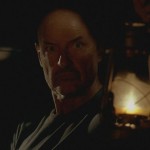 You can always be sure that the Locke-centric episodes will focus more on mythology than action and this episode didn’t disappoint. Between Locke’s creepy dream of Horace Goodspeed, his exploration of Jacob’s cabin, his conversation with Christian Shephard and an eerily entranced Claire, and the flashback scenes hinting at his strange childhood with appearances by an unchanged Richard Alpert, there were more than enough mysteries to keep fans occupied.
You can always be sure that the Locke-centric episodes will focus more on mythology than action and this episode didn’t disappoint. Between Locke’s creepy dream of Horace Goodspeed, his exploration of Jacob’s cabin, his conversation with Christian Shephard and an eerily entranced Claire, and the flashback scenes hinting at his strange childhood with appearances by an unchanged Richard Alpert, there were more than enough mysteries to keep fans occupied.
 This episode had a really good mix of suspense and mystery, closer to Seasons 1 & 2 Lost. Early on in the episode, we get a flash-forward of Jack where he goes to visit Hurley in the Santa Rosa Mental Hospital. Hurley hasn’t been taken his meds because he believes that he and the other Oceanic Six are all dead and that none of them actually made it off the island. Hurley asks Jack about his day and Jack tells him of his life now with Kate and Aaron. Hurley compares Jack’s life with Kate to heaven. Hurley then mentions that he still sees Charlie and talks to him and Charlie had a message for Jack: that he’s “not supposed to raise him,” apparently referring to Aaron. Hurley then tells Jack that he would also be getting a visit from someone soon. That person winds up being Jack’s father, who Jack sees clearly sitting on the couch at the hospital where he works. So are Charlie and Jack’s father still alive? The simulation theory presented in “The Myth of Lost” predicted that they were, but not in the ghostly way that they’ve been appearing on the show.
This episode had a really good mix of suspense and mystery, closer to Seasons 1 & 2 Lost. Early on in the episode, we get a flash-forward of Jack where he goes to visit Hurley in the Santa Rosa Mental Hospital. Hurley hasn’t been taken his meds because he believes that he and the other Oceanic Six are all dead and that none of them actually made it off the island. Hurley asks Jack about his day and Jack tells him of his life now with Kate and Aaron. Hurley compares Jack’s life with Kate to heaven. Hurley then mentions that he still sees Charlie and talks to him and Charlie had a message for Jack: that he’s “not supposed to raise him,” apparently referring to Aaron. Hurley then tells Jack that he would also be getting a visit from someone soon. That person winds up being Jack’s father, who Jack sees clearly sitting on the couch at the hospital where he works. So are Charlie and Jack’s father still alive? The simulation theory presented in “The Myth of Lost” predicted that they were, but not in the ghostly way that they’ve been appearing on the show.
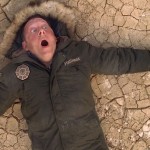 This is the first episode written after the writer’s strike, and to me, it felt like it. The story was rushed, the dialogue seemed out of place for the characters (i.e., Sawyer telling Ben that he’d kill him if he harmed on hair on Hurley’s head—since when does Sawyer care that much about anyone but himself?), and the action was kind of unbelievable at times (Sayid turning his head all the way around to notice Ben photographing him from atop a building behind him). In spite of this, or perhaps because of it, I also found this episode pretty funny.
This is the first episode written after the writer’s strike, and to me, it felt like it. The story was rushed, the dialogue seemed out of place for the characters (i.e., Sawyer telling Ben that he’d kill him if he harmed on hair on Hurley’s head—since when does Sawyer care that much about anyone but himself?), and the action was kind of unbelievable at times (Sayid turning his head all the way around to notice Ben photographing him from atop a building behind him). In spite of this, or perhaps because of it, I also found this episode pretty funny.
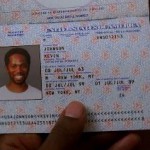 The first thing that stuck me as interesting in this episode was Michael, a.k.a., Kevin Johnson, responding to Sayid’s question about what he was doing there by saying that he was there to die. After watching the full episode, we may assume that he was referring to his repeated attempts at suicide, but if “The Myth of Lost” simulation theory is correct, Michael may be talking about something else—his desire to die and get out of the simulation already.
The first thing that stuck me as interesting in this episode was Michael, a.k.a., Kevin Johnson, responding to Sayid’s question about what he was doing there by saying that he was there to die. After watching the full episode, we may assume that he was referring to his repeated attempts at suicide, but if “The Myth of Lost” simulation theory is correct, Michael may be talking about something else—his desire to die and get out of the simulation already.
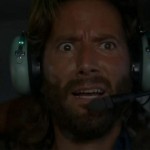 Besides being vastly intriguing, another reason I love “The Constant” is because it gets back to the mythology that’s been mostly missing this season. In this episode, we see that Desmond’s mind is moving back and forth between his life in and around the island, and his life in the so-called real world. Even though he’s not on the island during the time-jumps, he’s still apart of it. He may even still be in the simulation. In The Myth of Lost, I mention how the Portuguese guys who contact Penny from some frigid region are also within the simulation—just another part of it. Similarly, it is entirely possible that Desmond is still in the simulation, but only the area in and around the island is affected by the glitch. As Desmond crossed through the infected area of the simulation, it may have infected him, bringing about the time-jumps in his consciousness as his mind is hooked up to the program.
Besides being vastly intriguing, another reason I love “The Constant” is because it gets back to the mythology that’s been mostly missing this season. In this episode, we see that Desmond’s mind is moving back and forth between his life in and around the island, and his life in the so-called real world. Even though he’s not on the island during the time-jumps, he’s still apart of it. He may even still be in the simulation. In The Myth of Lost, I mention how the Portuguese guys who contact Penny from some frigid region are also within the simulation—just another part of it. Similarly, it is entirely possible that Desmond is still in the simulation, but only the area in and around the island is affected by the glitch. As Desmond crossed through the infected area of the simulation, it may have infected him, bringing about the time-jumps in his consciousness as his mind is hooked up to the program.
 I loved this episode, not so much because it was a particularly good episode, which, mythologically speaking, it wasn’t, but because of it’s cool pop culture references. First it had Hurley watching the 1980 cult classic, Xanadu, which was so random, it was hilarious. Secondly, it had Kate using an old cartoon trick to fool Hurley into telling her where Locke was hiding Miles. Upon figuring out that he’d been tricked, Hurley says, “You just totally Scooby-Doo’d me, didn’t you?”
I loved this episode, not so much because it was a particularly good episode, which, mythologically speaking, it wasn’t, but because of it’s cool pop culture references. First it had Hurley watching the 1980 cult classic, Xanadu, which was so random, it was hilarious. Secondly, it had Kate using an old cartoon trick to fool Hurley into telling her where Locke was hiding Miles. Upon figuring out that he’d been tricked, Hurley says, “You just totally Scooby-Doo’d me, didn’t you?”
 I’ve come to the conclusion that while still very entertaining and intriguing, Lost has become a completely different show. Once falling in the realm of myth or sci-fi/fantasy, now, I’d say it’s more some suspense/action adventure drama. There really isn’t a lot of mythology on the show anymore, and that is exactly the scenario I had feared which inspired me to write The Myth of Lost. At only three episodes into the new season, Lost definitely has time to redeem itself, but I really wish it would start answering the questions about the mythology before giving us new, relatively unrelated plot mysteries. Still, the more questions Lost leaves unanswered, the more satisfying a book with a theory that answers them is likely to be, so I guess I won’t look a gift horse in the mouth.
I’ve come to the conclusion that while still very entertaining and intriguing, Lost has become a completely different show. Once falling in the realm of myth or sci-fi/fantasy, now, I’d say it’s more some suspense/action adventure drama. There really isn’t a lot of mythology on the show anymore, and that is exactly the scenario I had feared which inspired me to write The Myth of Lost. At only three episodes into the new season, Lost definitely has time to redeem itself, but I really wish it would start answering the questions about the mythology before giving us new, relatively unrelated plot mysteries. Still, the more questions Lost leaves unanswered, the more satisfying a book with a theory that answers them is likely to be, so I guess I won’t look a gift horse in the mouth.
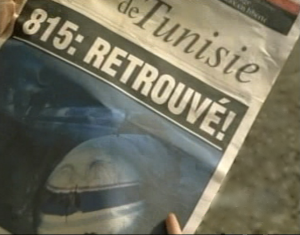 Oh, the tangled web Lost weaves. The episode begins with an underwater search craft stumbling upon the remains of Oceanic Flight 815. Once again, it would seem that the gangs’ flight did really crash after all. But not so fast. Interestingly, the parts of the plane that are being shown underwater—the nose for example—had already been seen on the island. So how can it be in two places at once? Unless, as one of the sub-theories of The Myth of Lost theory suggests, this is the real-life version of the plane that exists in the simulation. Another possibility is that this is a dummy plane with dummy corpses or substitute bodies meant to decoy whatever really happened to flight 815. In other words, Oceanic may have staged this wreckage.
Oh, the tangled web Lost weaves. The episode begins with an underwater search craft stumbling upon the remains of Oceanic Flight 815. Once again, it would seem that the gangs’ flight did really crash after all. But not so fast. Interestingly, the parts of the plane that are being shown underwater—the nose for example—had already been seen on the island. So how can it be in two places at once? Unless, as one of the sub-theories of The Myth of Lost theory suggests, this is the real-life version of the plane that exists in the simulation. Another possibility is that this is a dummy plane with dummy corpses or substitute bodies meant to decoy whatever really happened to flight 815. In other words, Oceanic may have staged this wreckage.
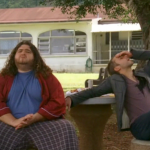 Just as predicted in “The Myth of Lost,” not all of the castaways have made it off the island—at least not this time. Apparently, there are only six, and my guess is that all of them will need to go back if they want to be cured.
Just as predicted in “The Myth of Lost,” not all of the castaways have made it off the island—at least not this time. Apparently, there are only six, and my guess is that all of them will need to go back if they want to be cured.
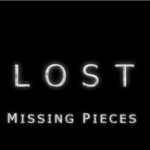 Thirteen webisodes/mobisodes that were released weekly from November 2007 to February 2008 on abc.com (and Verizon mobile phones). Running between 1:22–3:27 in length, each mobisode filled in a gap in the story from LOST’s first three seasons. Episodes can now be found on YouTube. What follows below is the name of each episode, a brief description, and some points on how it fits in with the simulation theory presented in “The Myth of Lost.”
Thirteen webisodes/mobisodes that were released weekly from November 2007 to February 2008 on abc.com (and Verizon mobile phones). Running between 1:22–3:27 in length, each mobisode filled in a gap in the story from LOST’s first three seasons. Episodes can now be found on YouTube. What follows below is the name of each episode, a brief description, and some points on how it fits in with the simulation theory presented in “The Myth of Lost.”
 You can always be sure that the Locke-centric episodes will focus more on mythology than action and this episode didn’t disappoint. Between Locke’s creepy dream of Horace Goodspeed, his exploration of Jacob’s cabin, his conversation with Christian Shephard and an eerily entranced Claire, and the flashback scenes hinting at his strange childhood with appearances by an unchanged Richard Alpert, there were more than enough mysteries to keep fans occupied.
You can always be sure that the Locke-centric episodes will focus more on mythology than action and this episode didn’t disappoint. Between Locke’s creepy dream of Horace Goodspeed, his exploration of Jacob’s cabin, his conversation with Christian Shephard and an eerily entranced Claire, and the flashback scenes hinting at his strange childhood with appearances by an unchanged Richard Alpert, there were more than enough mysteries to keep fans occupied.









